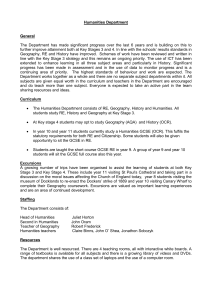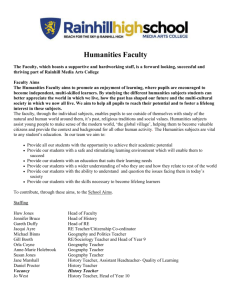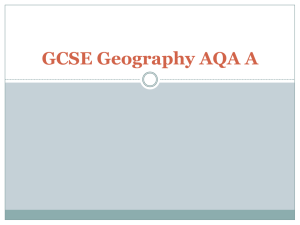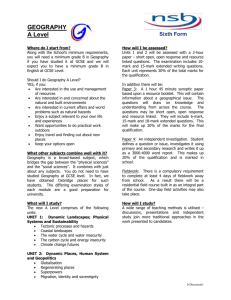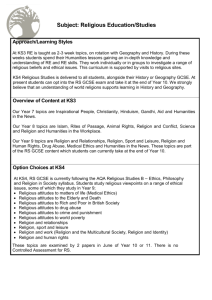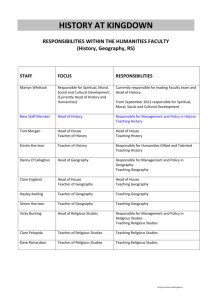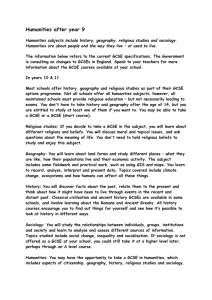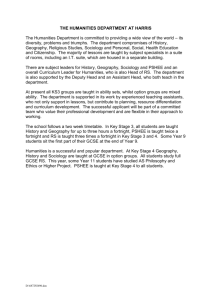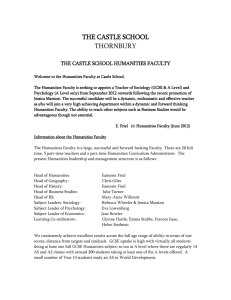Head of the Humanities Faculty – Subject and Role Summary The
advertisement
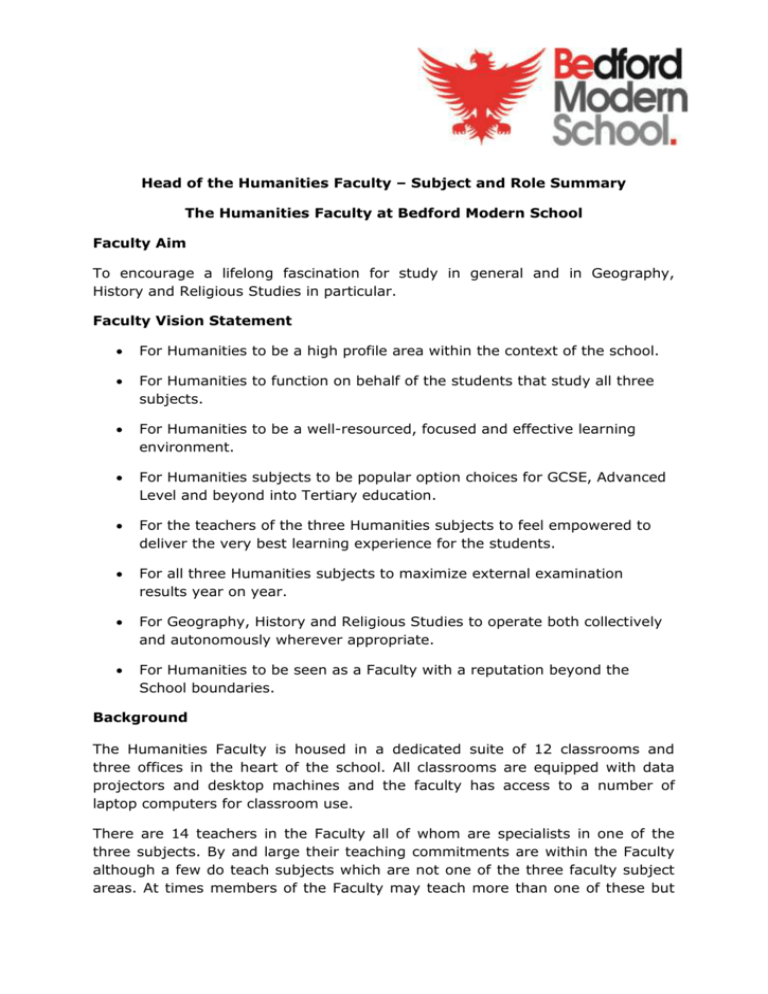
Head of the Humanities Faculty – Subject and Role Summary The Humanities Faculty at Bedford Modern School Faculty Aim To encourage a lifelong fascination for study in general and in Geography, History and Religious Studies in particular. Faculty Vision Statement For Humanities to be a high profile area within the context of the school. For Humanities to function on behalf of the students that study all three subjects. For Humanities to be a well-resourced, focused and effective learning environment. For Humanities subjects to be popular option choices for GCSE, Advanced Level and beyond into Tertiary education. For the teachers of the three Humanities subjects to feel empowered to deliver the very best learning experience for the students. For all three Humanities subjects to maximize external examination results year on year. For Geography, History and Religious Studies to operate both collectively and autonomously wherever appropriate. For Humanities to be seen as a Faculty with a reputation beyond the School boundaries. Background The Humanities Faculty is housed in a dedicated suite of 12 classrooms and three offices in the heart of the school. All classrooms are equipped with data projectors and desktop machines and the faculty has access to a number of laptop computers for classroom use. There are 14 teachers in the Faculty all of whom are specialists in one of the three subjects. By and large their teaching commitments are within the Faculty although a few do teach subjects which are not one of the three faculty subject areas. At times members of the Faculty may teach more than one of these but this is rare. Under the Head of Faculty, each subject has a Head of Subject who is a specialist in that field of study. Geography, History and Religious Studies are all compulsory in Years 7-9 when students have 3 periods of each per 60 period (2 week) cycle. Students in Year 10 are expected to study at least one Humanities subject to GCSE (which at BMS is taken to include Classical Civilisation, a subject found within the Languages and Classics Faculty) and students have 6 periods per cycle. All three subjects are popular A level choices, when students are timetabled for 12 periods per cycle delivered by two teachers, and a healthy number of students pursue the subjects at degree level every year. This is predominantly Russell Group Universities with regular take up from the Oxbridge Colleges. Examination results in the Summer 2013 were as follows: GCSE Year 11 Geography History Religious Studies A level Year 13 Geography History Religious Studies Numbers Percentages Total A* A B C D %A*/A %A*-C 86 76 70 22 30 45 40 33 16 18 10 7 4 3 2 2 0 0 72 83 87 98 100 100 Numbers Percentages Total A* A B C D %A*/A %A*-B %A*-C 31 24 8 3 2 2 11 9 2 8 7 1 7 5 2 1 1 1 45 46 50 71 75 63 97 96 88 Geography The 5 full-time teachers of Geography are led by Mr Nigel Robinson. The work studied in Years 7 to 9 builds on that carried out in KS2. Homework is issued once every cycle. Themes include: Local Geography, Tectonics, Rivers and Flooding, Weather and Climate, Tourism, USA, Coasts, the study of an LEDC – Brazil, Eco-systems and Crime. At GCSE the department follows the AQA syllabus A course. There are three units of work - Physical Geography, Human Geography and Controlled Assessment. There are two written exams worth 75% and the Controlled Assessment which is worth 25%. Topics include: The restless earth, rocks resources and scenery, weather and climate, living world, Population Change, changing urban environments, changing rural environments, the development gap, globalisation and tourism. At A level the department follows the very contemporary Edexcel syllabus which is loosely divided into Human and Physical Geography. The themes include: Consuming the Rural Landscape, Cold Environments, World at Risk, Globalisation, Crowded Coasts, Rebranding, Energy Security, Water Conflicts, Biodiversity under threat, Superpower Geographies, Bridging the Development Gap and Technological Fix. The Geography Department is committed to enriching the experience of their students both within the classroom and beyond. Field work forms an essential part of the courses because it provides in - depth case study material about specifically selected sites: a major ingredient in achieving a top grade. Field Trips are arranged during the course of the year, including a visit overseas. They have recently visited North Norfolk, Docklands, the Olympic site and Iceland. Future plans include a trip to the French Alps. History The History Department is made up of five full time staff, two of whom also deliver Government and Politics at A level, and is led by Mrs Sarah Wright. In Year 7 students study Britain 1066-1485, with an in depth study on the Crusades. In Year 8 students study Britain 1603-1666 and the impact of the British Empire linking closely with R.E. and Geography units. In Year 9 students study Britain and the First World War, and America c.1890-1941 linking closely with English and R.E. Units. These topics also provide a contextual background for GCSE material. The department follow the AQA History B (Modern World) specification and around 50% of the year group opt to study it. There are two written exams worth 75% and the Controlled Assessment which is worth 25%. Unit 1 is International Relations, 1918-1960, whilst in Unit 2, students study Weimar and Nazi Germany and Race Relations in the USA, 1945-1968. Unit 3 involves students completing two pieces of source work under Controlled Assessment conditions. This is completed during the Autumn term of Year 11; the topic studied changes every year. At A level the department follow the AQA syllabus encompassing both Modern and Early Modern options. The combination of both allows continuation and development of areas touched on at GCSE as well as studying material from outside the period covered at GCSE. Lessons take the form of tutorials, class debates, presentations, reading and note-taking and individual research. In Year 12 students study Britain, 1483-1529 and the USA and Vietnam, 19611975. In Year 13 students study Britain, 1547-1603 which is examined at the end of Year 13. Students also complete a Historical Enquiry on the reasons for the British involvement in Africa between 1795 and 1965. A significant number of students go on to study History or a History-related course at university, including Oxford and Cambridge. The Department currently provides the following enrichment opportunities: A medieval day in Year 7, a Civil War Day in Year 8, including a visit to the Battlefield at Naseby and a First World War Living History Day in Year 9. We offer an optional Year 9 First World War Battlefields Trip to Ypres, Belgium, whilst Year 11 see ‘Hitler on Trial’ to help with their understanding of interpretation. The sixth form attend conferences in London and can also visit Washington DC as part of a joint trip with the Politics Department. There is also an opportunity to participate in producing a student run History magazine. Religious Studies The Religious Studies Department is made up of 3 full-time and one part time member of staff and is led by Mr Jonathan Hooper. In Year 7 students experience an engaging and interactive investigation of different belief systems including a concluding visit to places of worship relevant to the subjects covered: Islam Christianity Hinduism This includes spending one lesson a fortnight studying Philosophy. Cross faculty teaching in Year 8 considers issues relating to Equality and Inequality and linking it to Human and Civil rights in a post-Imperial/Colonial era. In Year 9 students consider, ‘conflict’, ‘life after death and life and death issues’, and the background and significance of the debates between religion and doubt: arguments and counter arguments for the existence of God. Religious Studies is a popular GCSE option with split teaching which approximately half of each year group choose. The department follow the Edexcel Religious Studies Specification focusing on: Christianity Islam Increasing numbers of students are choosing the subject at Sixth-form level. The topics covered include: Utilitarianism Situation Ethics Medical Ethics Islamic theology Fundamentalism. There are numerous Departmental trips – last year to local places of worship, and the British Museum. We regularly invite in external speakers, most recently Professor A. C. Grayling, and attend conference days. There are both Departmental and Faculty discussion groups. November 2013
